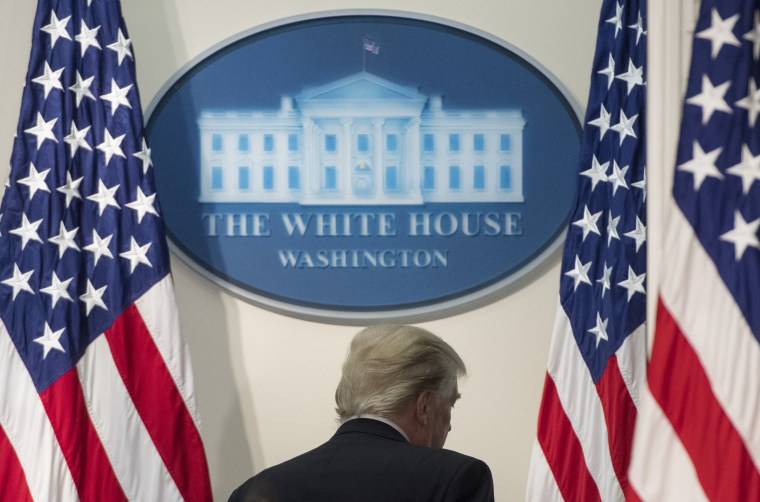As Michael Cohen, Donald Trump's former lawyer and fixer, settles in for his first full day as an inmate in a federal prison, it's easy to remember what the Republican lawyer told Congress during his sworn testimony in February about the president and his re-election bid.
"Given my experience working for Mr. Trump," Cohen said, "I fear that if he loses the election in 2020, that there will never be a peaceful transition of power."
He's not the only one who's concerned. House Speaker Nancy Pelosi (D-Calif.) conceded to the New York Times that she too worries what might happen next year if Trump loses and decides to challenge the legitimacy of a Democratic victory. "We have to inoculate against that," she told the Times, "we have to be prepared for that."
It's easy to see concerns like these as far-fetched, though the president himself, who's never shown any interest in protecting democratic institutions or the legitimacy of the rule of law, isn't exactly going out of his way to inspire confidence. Politico noted over the weekend:
President Donald Trump on Sunday floated the idea of extending his constitutionally limited time in office, complaining online that two years of his first White House term were "stollen" as a result of special counsel Robert Mueller's investigation."I now support reparations -- Trump should have 2 yrs added to his 1st term as pay back for time stolen by this corrupt failed coup," Jerry Falwell Jr., a conservative religious leader and Trump ally, tweeted in a message reposted by the president.Trump echoed Falwell's sentiment in a pair of tweets an hour later, writing online: "Despite the tremendous success that I have had as President, including perhaps the greatest ECONOMY and most successful first two years of any President in history, they have stollen two years of my (our) Presidency (Collusion Delusion) that we will never be able to get back."
Part of the oddity with this is the underlying assertion that the investigation into Trump's conduct was somehow a dud and the allegations against him have been discredited. Reality tells a very different story: there was no attempted "coup"; the investigation wasn't "corrupt"; and the scrutiny of the president's behavior led to revelations of alleged criminal misconduct.
Even if Trump had been fully exonerated, he wouldn't be entitled to extra time in office, but any fair analysis of what we've learned paints an unflattering portrait of a president indifferent to legal lines.
But at the heart of Trump's tweets is something darker than just routine lies.
The amateur president with authoritarian instincts obviously hopes voters reward him with four more years in the White House, but Trump's occasional talk about extra time in office is altogether scarier.
Indeed, the weekend's tweets weren't entirely unique. In March 2018, Trump praised China's President Xi Jinping for extending his hold on power. "He's now president for life," the Republican said. "President for life... I think it's great. Maybe we'll have to give that a shot someday."
White House officials have said comments like these are intended to be funny. Perhaps. But Ruth Ben-Ghiat, a New York University professor who studies authoritarian rulers, said something to the Washington Post that stood out for me: "Everything that he says is a trial balloon -- even his, quote, jokes are trial balloons. But if you look at what he jokes about, it's always things like this -- it's the extension of his rights, it's the infringement of liberties. And authoritarians are continually testing the boundaries to see what they can get away with, and everything he does is a challenge to Democrats to mount some response against him."
All of which suggests that when Trump floats extra-constitutional and undemocratic trial balloons, it's hard to blame fair-minded observers who start reaching for their sling shots.
Part of me is curious, though, about the practical considerations. Let's say, hypothetically, that Trump narrowly loses a tough re-election campaign next year, at which point the president decides to challenge the legitimacy of the election. Given that he's repeatedly questioned the results of the 2016 race -- and he won that election -- it stands to reason he'd be vastly more aggressive in the wake of a narrow defeat.
But what would that look like, exactly? Would we see Trump order federal officials not to cooperate with a transition process? Would he dispatch the National Guard? Would he publicly call on his followers to "march on Washington" and launch a "revolution" against the nation's elected government -- which is exactly what Trump did in 2012 when he thought Barack Obama had won the electoral college but not the popular vote?
I don't know if the current president would do any of these things in the wake of a defeat, but in light of everything we've seen from Trump, his "jokes" about the matter aren't funny.
